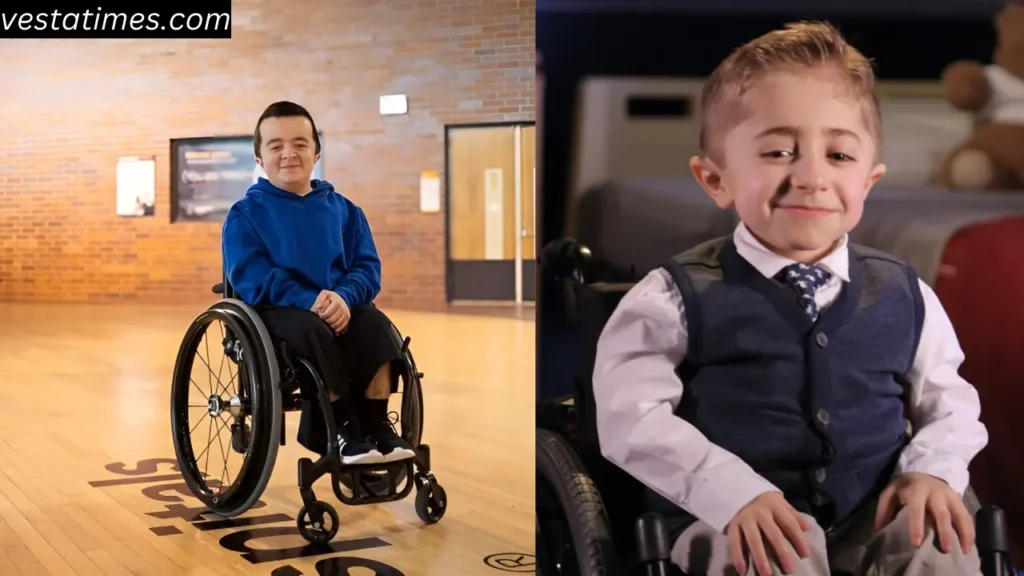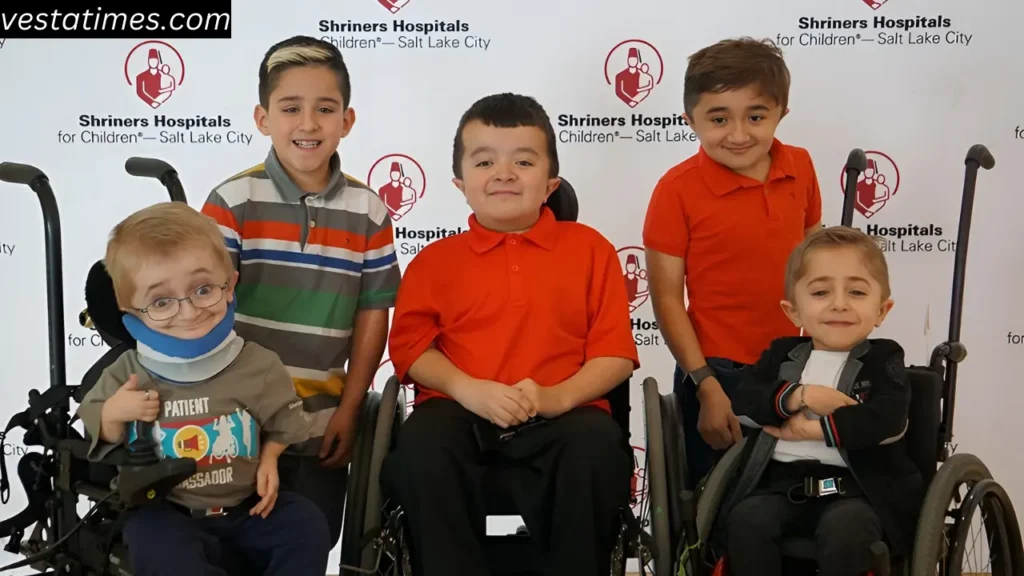In the world of charitable organizations, few names are as recognizable as Alec Cabacungan and Kaleb-Wolf De Melo Torres. These two young men, who have both battled a rare condition known as Osteogenesis Imperfecta, have become the faces of Shriners Hospitals for Children. Their infectious smiles and positive attitudes have touched the hearts of many, leading to widespread admiration and curiosity about their lives, especially regarding the question, Do Alec and Kaleb get paid for commercials?
The story of Alec and Kaleb is not just about their medical journeys; it’s also about how they have used their visibility to raise awareness and funds for a cause they deeply care about. Their appearances in commercials for Shriners Hospitals have made them household names, and many people wonder if their involvement in these campaigns is purely voluntary or if they receive financial compensation. This question, Do Alec and Kaleb get paid for commercials? has sparked much interest among their admirers.
In this article, we will explore the lives of Alec and Kaleb, and their contributions to Shriners Hospitals for Children, and address the question, Do Alec and Kaleb get paid for commercials? We will also look into their net worth, their current activities, and the lasting impact they have had on the world. Join us as we take a closer look at the journey of these remarkable young men.
Who Are Alec and Kaleb?

Alec Cabacungan: A Journey of Resilience
Alec Cabacungan was born on May 8, 2002, in Oak Park, Illinois. From a young age, Alec has been a patient at Shriners Hospitals for Children due to his diagnosis of Osteogenesis Imperfecta, a genetic disorder characterized by fragile bones that break easily. Despite the challenges posed by his condition, Alec has always been determined to lead a fulfilling life.
Alec’s journey with Shriners began when he was just a child, and over the years, he has undergone numerous surgeries and treatments to manage his condition. However, Alec’s resilience and positive outlook on life have made him a beacon of hope for many others facing similar challenges. His involvement with Shriners Hospitals has not only helped him receive the medical care he needs but has also allowed him to become a spokesperson for the organization, raising awareness and funds for children with similar conditions.
Kaleb-Wolf De Melo Torres: A Story of Strength
Kaleb-Wolf De Melo Torres, born on June 28, 2009, in Winnipeg, Manitoba, Canada, shares a similar story of strength and perseverance. Like Alec, Kaleb was born with Osteogenesis Imperfecta, and he has been a patient at Shriners Hospitals for Children since infancy. Kaleb’s condition has required extensive medical care, including multiple surgeries and ongoing treatments to manage the effects of his brittle bones.
Despite the physical challenges he faces, Kaleb’s spirit remains unbroken. He has become an ambassador for Shriners Hospitals, using his platform to inspire others and raise awareness about the condition he lives with. Kaleb’s involvement in Shriners commercials has brought him into the spotlight, where he has touched the hearts of many with his courage and determination.
Their Role as Ambassadors for Shriners Hospitals
Alec and Kaleb’s roles as ambassadors for Shriners Hospitals for Children have extended beyond their personal medical journeys. They have become the faces of the organization, appearing in commercials and promotional materials that highlight the work of Shriners Hospitals. Through their involvement, they have helped raise awareness about the hospital’s mission to provide specialized medical care to children, regardless of their ability to pay.
The commercials featuring Alec and Kaleb are often emotional and impactful, showcasing their resilience and the life-changing care they receive at Shriners Hospitals. These commercials have not only helped raise funds for the organization but have also brought attention to the needs of children with complex medical conditions.
Do Alec and Kaleb Get Paid for Commercials?
Understanding Their Involvement in Commercials
Alec and Kaleb’s appearances in commercials for Shriners Hospitals for Children have made them well-known figures in the media. These commercials often depict their daily lives, the challenges they face due to their medical conditions, and the support they receive from Shriners Hospitals. Their stories resonate with many viewers, leading to increased awareness and donations to the hospital.
Given their frequent appearances in these commercials, many people wonder whether Alec and Kaleb are compensated for their involvement. While the exact details of their compensation are not publicly disclosed, it is understood that their participation is voluntary, and any compensation they receive is likely used to support their ongoing medical care and personal needs.
The Impact of Their Work
Alec and Kaleb’s work as spokespeople for Shriners Hospitals has had a significant impact on the organization’s ability to raise funds and continue providing care to children with complex medical needs. Their stories have inspired countless individuals to donate to Shriners Hospitals, ensuring that the hospital can continue its mission of providing free or low-cost care to children in need.
While Alec and Kaleb may receive some form of compensation for their work, it is clear that their primary motivation is to help others and raise awareness about the importance of specialized pediatric care. Their dedication to this cause has made a lasting difference in the lives of many children and families.
Kaleb’s Net Worth: What We Know
As a result of his work with Shriners Hospitals and his growing public profile, there has been speculation about Kaleb’s net worth. According to various sources, Kaleb’s net worth is estimated to be around $5 million. This figure, however, is based on unofficial reports, and the exact details of Kaleb’s financial situation are not publicly known.
Kaleb’s net worth may include earnings from his work with Shriners Hospitals, as well as any other endorsements or opportunities he has received as a result of his public profile. Regardless of the exact amount, it is clear that Kaleb’s involvement with Shriners Hospitals has had a positive impact on his life and the lives of many others.
Alec Cabacungan’s Net Worth: An Overview
The Financial Impact of His Work
Alec Cabacungan’s work as a spokesperson for Shriners Hospitals has also led to speculation about his net worth. Like Kaleb, Alec has become a well-known figure due to his appearances in commercials and his advocacy work. While there is no official information about Alec’s net worth, it is estimated to be between $500,000 and $1 million.
Alec’s net worth likely includes earnings from his work with Shriners Hospitals, as well as any other opportunities he has pursued, such as public speaking engagements or collaborations with brands. Despite any financial benefits, Alec’s primary focus remains on raising awareness for Shriners Hospitals and helping other children with similar conditions.
Alec’s Continued Advocacy
Alec’s advocacy work has extended beyond his role with Shriners Hospitals. He has used his platform to speak out about the challenges faced by individuals with Osteogenesis Imperfecta and the importance of accessible healthcare. Alec’s commitment to these causes has earned him recognition and respect from many in the medical and philanthropic communities.
While Alec’s financial success is noteworthy, it is his dedication to helping others that truly sets him apart. His work has inspired countless individuals to support Shriners Hospitals and advocate for better healthcare for all children.
Is Alec Cabacungan Still Alive?
One question that has occasionally arisen about Alec is whether he is still alive. This question likely stems from the seriousness of his medical condition and the challenges he faces. However, as of the most recent information available, Alec Cabacungan is very much alive and continues to be an active advocate for Shriners Hospitals.
Alec recently graduated from Northwestern University with a degree in Sports Broadcasting Journalism, a significant achievement that highlights his determination and resilience. Alec has shared his graduation journey on social media, expressing gratitude to those who have supported him along the way.
The Shriners Hospital Scandal: A Controversial Topic

Understanding the Allegations
Shriners Hospitals for Children has long been recognized for its dedication to providing specialized medical care to children, regardless of their families’ financial situations. However, the organization has not been without controversy. Some critics have accused Shriners Hospitals of exploiting the children in their care by using them in commercials to solicit donations.
These allegations suggest that the hospital may be taking advantage of the children’s conditions to generate sympathy and financial support. While these claims have sparked debate, it is essential to consider the broader impact of the hospital’s work and the role that Alec and Kaleb play in raising awareness for a worthy cause.
The Role of Alec and Kaleb
Alec and Kaleb’s involvement in Shriners Hospitals’ commercials is central to the controversy. Critics argue that the hospital’s use of children with visible disabilities in their advertisements may be exploitative. However, supporters of the hospital and the children involved argue that these commercials are a powerful way to raise awareness and generate much-needed funds.
Alec and Kaleb themselves have expressed their commitment to helping other children through their work with Shriners Hospitals. Their personal stories and experiences with the hospital provide a compelling narrative that resonates with viewers and encourages them to support the hospital’s mission.
Balancing Awareness and Ethical Considerations
The debate over Shriners Hospitals’ advertising practices raises important questions about how to balance raising awareness with ethical considerations. While it is crucial to ensure that children like Alec and Kaleb are not exploited, it is also essential to recognize the positive impact that their work has had on the hospital and the many children it serves.
Ultimately, the goal of these commercials is to provide viewers with a glimpse into the lives of children who benefit from Shriners Hospitals’ care and to encourage support for the hospital’s mission. By sharing their stories, Alec and Kaleb have helped raise millions of dollars for the hospital, ensuring that it can continue to provide life-changing care to children in need.
The Lasting Impact of Alec and Kaleb’s Work
Inspiring Others Through Their Stories
Alec Cabacungan and Kaleb-Wolf De Melo Torres have become symbols of hope and resilience for many. Their stories have inspired countless individuals to overcome their challenges and pursue their dreams, regardless of the obstacles they may face. Through their work with Shriners Hospitals, Alec and Kaleb have shown that it is possible to make a positive impact on the world, even in the face of adversity.
Their appearances in commercials have not only raised awareness for Shriners Hospitals but have also brought attention to the broader issues faced by children with disabilities. By sharing their experiences, Alec and Kaleb have helped break down stereotypes and promote a more inclusive society.
Alec and Kaleb’s Current Activities
As of the latest information available, both Alec and Kaleb continue to be active advocates for Shriners Hospitals and other causes they care about. Alec is pursuing a career in sports broadcasting, having recently graduated from Northwestern University. He has expressed a desire to use his platform to continue raising awareness for children with disabilities and advocating for accessible healthcare.
Kaleb, meanwhile, remains involved with Shriners Hospitals and continues to inspire others with his positive attitude and determination. Although he is still young, Kaleb has already made a significant impact on the world and is likely to continue his advocacy work in the years to come.
Conclusion
Alec Cabacungan and Kaleb-Wolf De Melo Torres have become beloved figures due to their work with Shriners Hospitals for Children. The question of “do Alec and Kaleb get paid for commercials” often arises, reflecting the curiosity surrounding their roles. However, what remains undeniable is the significant positive impact their involvement has had on the hospital and the many children it serves.
Both Alec and Kaleb have used their visibility to raise awareness for causes they deeply care about, continuing to inspire millions through their efforts. Whether they get paid for commercials or not, their advocacy work and personal achievements demonstrate how they have turned their challenges into opportunities to make a meaningful difference in the world.
As we reflect on their journeys, it is essential to recognize the broader message they convey: the importance of resilience, hope, and the power of giving back. Alec and Kaleb’s work with Shriners Hospitals has not only changed their lives but has also touched the lives of many others, ensuring that children in need can continue to receive the care and support they deserve.
FAQs
Do Alec and Kaleb get paid for commercials?
Yes, Alec Cabacungan and Kaleb-Wolf De Melo Torres are compensated for their appearances in commercials. While specific payment details are not publicly disclosed, their roles as brand ambassadors and spokespeople for Shriners Hospitals for Children suggest they receive payment for their contributions. Their involvement in high-profile campaigns and partnerships with major brands indicates that they are compensated for their work.
What is Kaleb from Shriners’ net worth?
Kaleb-Wolf De Melo Torres, known for his work with Shriners Hospitals, is estimated to have a net worth of around $5 million. This figure reflects his success as a prominent figure in charity commercials and brand endorsements. His financial standing is a result of his visibility and influence in these roles.
How much do Alec and Kaleb get paid for commercials?
The exact amount Alec and Kaleb receive for their commercials is not publicly available. However, given their high-profile roles and the scale of the brands they work with, it is reasonable to assume that they are paid well for their services. Their compensation likely reflects their significant impact and the value they bring to the campaigns they are involved in.
Is Alec Cabacungan still alive?
Yes, Alec Cabacungan is still alive. He continues to be an active advocate for Shriners Hospitals for Children and has recently achieved milestones in his personal life, such as graduating from Northwestern University. Alec’s ongoing presence and work are a testament to his resilience and dedication.
How old is Kaleb from Shriners Hospital?
Kaleb-Wolf De Melo Torres was born on June 28, 2009, which makes him 15 years old as of 2024. His age reflects his journey from a young child into a prominent figure advocating for Shriners Hospitals for Children, demonstrating his long-term involvement with the organization.
What impact have Alec and Kaleb had on Shriners Hospitals?
Alec and Kaleb have had a significant impact on Shriners Hospitals for Children by raising awareness and funds through their commercials and advocacy work. Their visibility has helped to highlight the hospital’s mission and the critical need for support, resulting in increased donations and support for the care of children in need. Their stories continue to inspire and motivate others to contribute to the hospital’s cause.



